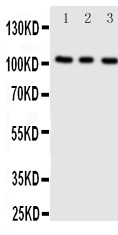
WB analysis of various samples using GTX12304 ADAMTS1 antibody. Lane 1 : rat liver tissue lysate at 50ug Lane 2 : rat heart tissue lysate at 50ug Lane 3 : rat brain tissue lysate at 50ug Dilution : 0.5 microg/mL
ADAMTS1 antibody
GTX12304
Overview
- SupplierGeneTex
- Product NameADAMTS1 antibody
- Delivery Days Customer9
- Application Supplier NoteWB: 0.1-0.5microg/ml. *Optimal dilutions/concentrations should be determined by the researcher.Not tested in other applications.
- ApplicationsWestern Blot
- CertificationResearch Use Only
- ClonalityPolyclonal
- Concentration500 ug/ml
- ConjugateUnconjugated
- Gene ID11504
- Target nameAdamts1
- Target descriptiona disintegrin-like and metallopeptidase (reprolysin type) with thrombospondin type 1 motif, 1
- Target synonymsA disintegrin and metalloproteinase with thrombospondin motifs 1; ADAM-; ADAMT; ADAMTS; ADAM-TS 1; ADAM-TS1; ADAMTS-1; C3-C5; METH1; METH-1
- HostRabbit
- IsotypeIgG
- Protein IDP97857
- Protein NameA disintegrin and metalloproteinase with thrombospondin motifs 1
- Scientific DescriptionThis gene encodes a member of the ADAMTS (a disintegrin and metalloproteinase with thrombospondin motif) family and preproprotein that is proteolytically processed to generate a mature protein product. This secreted protein product plays an important role in ovulation, likely through its cleavage of the extracellular matrix component versican. The encoded protein may enhance tumorigenesis in a mouse model of breast cancer. Homozygous knockout mice for this gene exhibit enhanced perinatal lethality, impaired growth and adipose tissue development, and impaired ovulation in females. [provided by RefSeq, Oct 2015]
- ReactivityMouse, Rat
- Storage Instruction-20°C or -80°C,2°C to 8°C
- UNSPSC12352203
